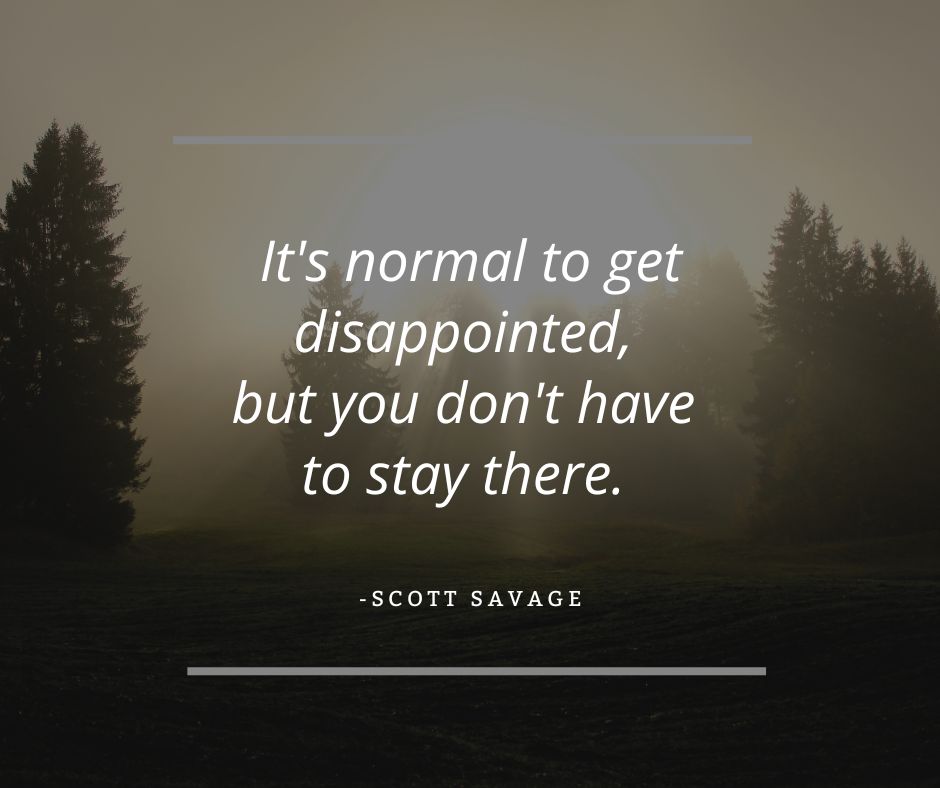Healing From Disappointmentਨਮੂਨਾ


Disappointment often begins when we are very young.
For example, a video from a late-night comedy show in America went viral several years ago. The host showed several videos submitted by parents in which they stole or ate all their kids' Halloween candy, filming their responses. Of course, the kids had very emotional reactions, threw tantrums, and otherwise made for entertaining moments.
While I felt terrible for the kids who were deceived by their parents in pursuit of a laugh, I did think to myself, "This sure prepares them for what life is like as an adult." Consider the past week of your life, for instance. Weren't there at least a few moments that didn't go as you wanted or expected? I was able to count up four or five very quickly!
In life, we are all disappointed, and we all disappoint others. Sometimes, we feel crushed by disappointment, and others feel crushed by disappointment with us.
There are three main ways that people react to disappointment. First, some people deny that they were ever disappointed.
Denial is my most common response. Several years ago, I applied for a new job at the church I was serving. A few months later, the search team informed me they would move forward with a different candidate. When asked about it, I denied how much it hurt. I said things like, "Oh, I didn't want it that much," and, "It's no big deal - I knew it was a long shot anyway." If I denied the disappointment, I thought it would hurt less; truthfully, it stung deeply anyway.
Second, others get depressed as a result of disappointment. (Note - I'm not talking about clinical depression here). If this is your common response, you may find it hard to get motivated again. Maybe getting out of bed in the morning or doing basic tasks becomes difficult. The people around you may notice your sadness or check in with you because you seem down.
Third, others give up after disappointment. Unmet expectations can lead to despair. In this category, you hear a response like, "The best way to avoid disappointment is not to expect anything from anyone." This third response embodies cynicism, where you build a cocoon for your heart so you don't get hurt and wounded again.
What if those three paths weren't your only options? What if you could exchange your disappointment for real hope? It's normal to get disappointed, but you don't have to stay there. We can exchange disappointment for hope because of what Jesus did for us. I often define hope as "a confident expectation in Christ in the face of reality."
This kind of hope doesn't deny reality. It is not about having a positive attitude while ignoring what's happening. I'm not suggesting you unequivocally trust people, even as they've betrayed you.
The Scriptures invite us to hope—to put our confidence in Christ while facing the truth of reality. This hope looks ahead to something we haven't yet achieved, and we are confident that God can bring it to life.
If you're battling disappointment today, I want you to know that God is near you. Psalm 34 tells us God is close to us when life breaks our hearts. In Matthew 5, Jesus promised us the blessing of God's comfort when we grieve. You may not recognize God's presence, but He's not far off.
In this plan, I want to help you understand how you can heal after disappointment. Over the next four days, you'll see how hope can be sustained amid disappointment. As a recovering cynic, I can tell you that exchanging disappointment for hope and allowing God to heal this part of your heart will transform you. It will also transform those around you.
Disappointment and cynicism not only affect you, but they also impact those around you. I'm so glad you started this plan because of the power your healing can have on the people around you.
I look forward to seeing you back here for day two of this plan, when we'll examine how our perspective on life can be healed and transformed.
ਪਵਿੱਤਰ ਸ਼ਾਸਤਰ
About this Plan

You've been disappointed, and you've disappointed someone else this year. We all experience disappointment, but disappointment doesn't have to define us. In this plan, I'll show you how to face your disappointment and watch God transform it. Healing is possible, and hope can be regained.
More
Related Plans

You Are Called: Discover Your God-Given Gifts to Fulfill Your Purpose

Pray With Power: 3 Days to Deepen Your Connection

Whole

Prayers for Career Guidance When You Feel Stuck at Work

Discovering Your Calling

The Little Ant

Strategy for Success

A Kid's Guide To: Bold Faith

Reading With the People of God #13 Nicene Creed
